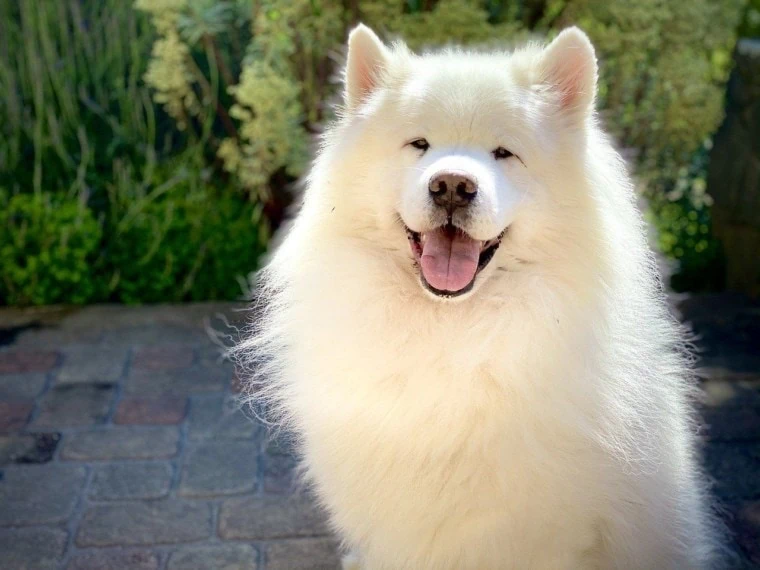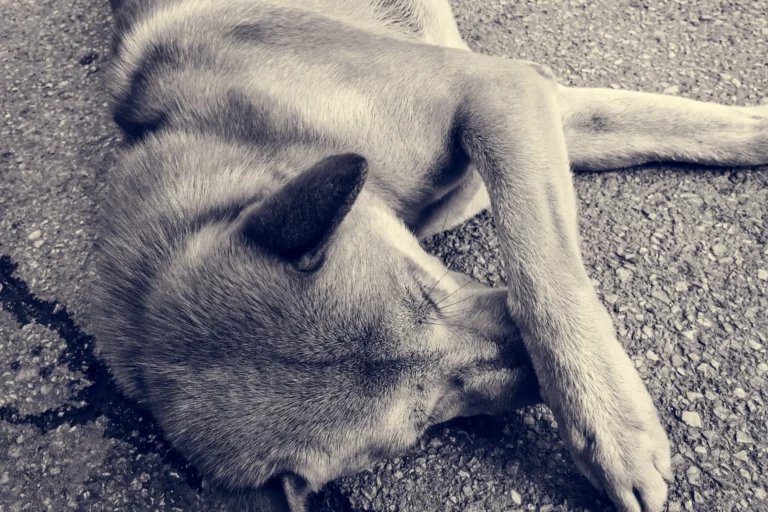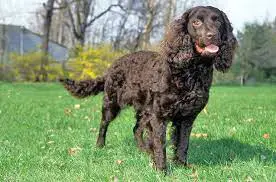Why Does My Dog Chew on Rocks? 5 Reasons & How to Stop It!
If you’ve ever caught your furry friend munching on stones, you’ve probably found yourself asking, “Why does my dog chew on rocks?” It’s a perplexing behavior that can be both concerning and dangerous.
From instinctual behaviors to nutritional deficiencies, there are several reasons why dogs may turn to such hard-to-digest materials.
In this post, we’ll delve into the reasons behind this puzzling habit, explore ways to discourage it, and address some frequently asked questions to help ensure your pet’s safety and wellbeing.
Let’s turn these stones over together and uncover some insights!
Key takeaways
Rock chewing in dogs may indicate boredom, nutritional deficiencies, or health issues.
This behavior can lead to dental problems and gastrointestinal blockages.
Behavioral training and safe chew toys can deter rock chewing.
Persistent rock chewing requires professional attention.
Regular exercise, diet balance, and mental stimulation can prevent rock chewing.
Understanding your dog’s behavior is key to their overall wellness.
Why Do Dogs Chew on Rocks?
Chewing on rocks might seem unusual to us, but to our canine companions, it could be a response to a range of factors:
1) Instinctual Behaviors
Dogs are descendants of wolves and share many instinctual behaviors. Chewing can be a natural behavior for teething puppies or adult dogs who need to keep their jaws strong and teeth clean.
2) Boredom or Anxiety
If dogs are left alone for long periods or don’t get enough physical exercise and mental stimulation, they might resort to chewing on rocks out of boredom or as a coping mechanism for anxiety.
3) Nutritional Deficiencies
Sometimes, dogs chew on rocks because of a condition known as pica, which involves eating non-food items. This could indicate a lack of certain nutrients in their diet.
4) Medical Conditions
Certain medical conditions, like gastrointestinal issues or diseases, can trigger pica. If your dog persistently chews on rocks, it’s worth consulting your vet to rule out any underlying health problems.
5) Exploration and Play
Dogs are naturally curious creatures. Sometimes, a rock might just be an intriguing new ‘toy’ that they’ve found during their explorations. However, this form of play can be hazardous and should be discouraged.
The Dangers of Rock Chewing
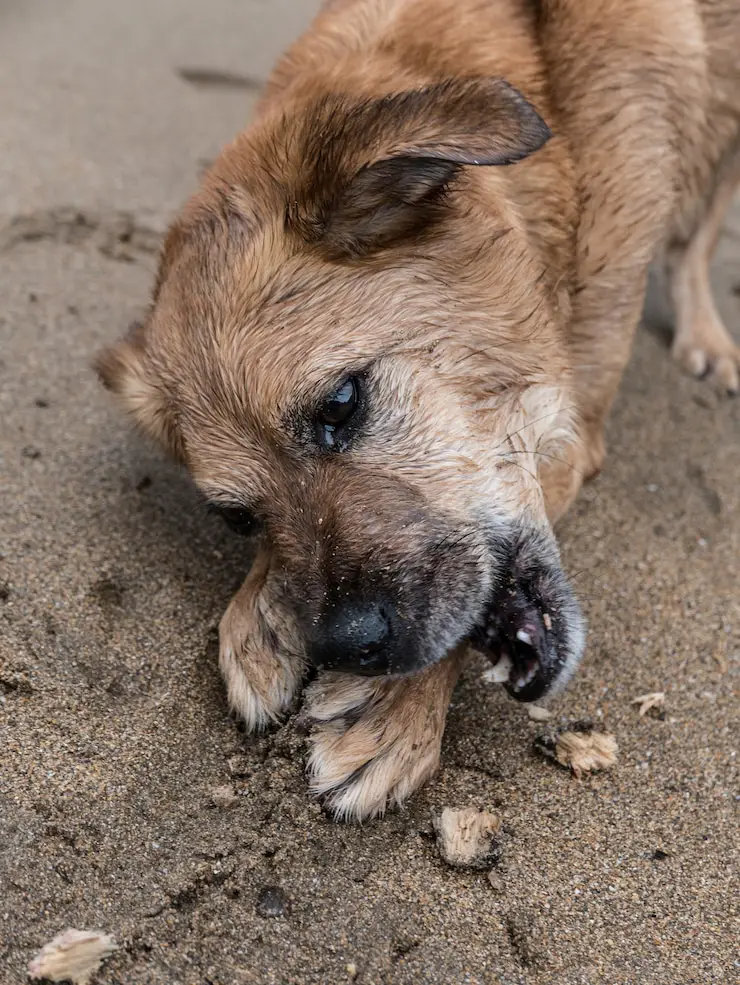
Chewing on rocks is more than just an odd habit—it can pose significant health risks to your canine friend.
Dental Damage
Rocks are hard and abrasive. Regular chewing can result in fractured teeth, damaged gums, or other oral injuries.
Choking Hazard
Smaller rocks pose a serious choking hazard if your dog tries to swallow them. Even if a rock isn’t large enough to cause choking, it could still get stuck somewhere in your dog’s digestive tract.
Internal Injuries and Blockages
If swallowed, rocks can cause internal damage or create blockages in the intestines. These issues may require urgent surgical intervention.
Nutritional Imbalances
Constantly chewing or eating rocks could result in your dog ingesting less food, leading to nutritional deficiencies. Plus, the act of consuming rocks might be a sign that these nutritional imbalances already exist.
How to Stop Your Dog from Chewing Rocks
Breaking your dog’s rock-chewing habit can be a multi-pronged approach that involves training, adjusting the environment, increasing mental stimulation, and reviewing their diet.
Training and Diversion Tactics
Teaching commands like “leave it” or “drop it” can be incredibly useful. When you notice your dog picking up a rock, use these commands and reward them when they respond correctly.
Environmental Control
Remove or limit access to areas with small rocks. When outside, keep your dog on a leash or supervise them closely in rocky areas.
Mental Stimulation and Exercise
A bored dog is more likely to chew on rocks. Providing plenty of physical exercise and mental stimulation can help curb this behavior. Try puzzle toys, treat-dispensing toys, or training games to keep them engaged.
Dietary Adjustments
If the rock chewing is related to nutritional deficiencies, a diet adjustment might be necessary. Always consult with your vet before making significant changes to your pet’s diet.
When to Consult a Vet
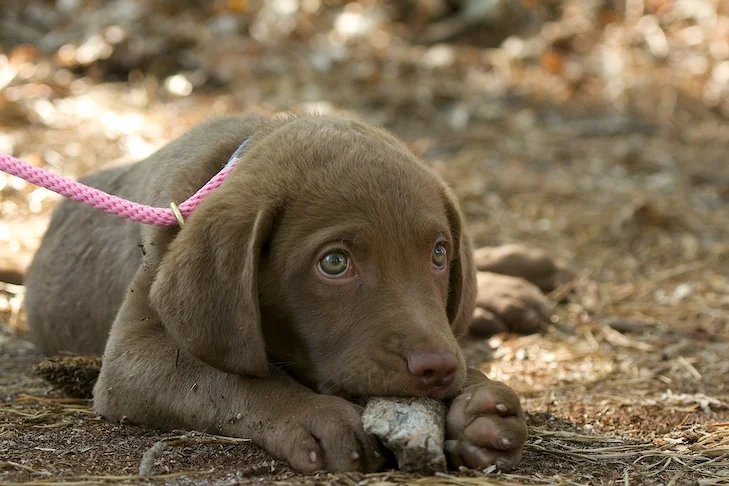
In some instances, your dog’s rock-chewing habit might require professional intervention.
Persistent Rock Chewing
If your training efforts don’t seem to deter your dog from chewing rocks, it’s time to consult with a professional. A veterinarian or a certified dog behaviorist can offer strategies tailored to your dog’s needs.
Signs of Illness or Injury
If your dog shows signs of discomfort, such as reduced appetite, lethargy, vomiting, or changes in bowel movements, seek immediate veterinary care. These could be signs of internal damage or blockage caused by swallowed rocks.
Nutritional Consultation
Your vet can guide you on dietary changes or supplements if your dog’s rock chewing stems from nutritional deficiencies. Regular health check-ups can ensure your pet’s diet is meeting all their nutritional needs.
Preventing the Rock-Chewing Behavior
Prevention is always the best strategy when it comes to your dog’s health and wellbeing. Here are some ways to prevent your dog from developing a rock-chewing habit in the first place:
Routine Exercise and Play
Regular exercise and play can help alleviate boredom and anxiety, reducing the chances of your dog turning to rocks for amusement or stress relief.
Enriching Environment
Provide your dog with a variety of safe toys and chewables. These can satisfy your dog’s natural urge to chew and offer a safer alternative to rocks.
Balanced Nutrition
A balanced, nutrient-rich diet can prevent deficiencies that might cause pica behavior. Regular vet check-ups can ensure your dog’s diet is keeping up with their nutritional needs.
Regular Supervision
When you’re out in areas with rocks, keep a watchful eye on your dog. Early intervention can prevent a single incident of rock chewing from turning into a habit.
Early Training
Train your dog early with commands like “leave it” and “drop it”. These commands are useful in a variety of situations, not just when your dog picks up a rock.
Interviews with Veterinarians and Behaviorists on Rock Chewing
To better understand why dogs chew on rocks and how to address it, we reached out to several experts in the field:
Dr. Michael Doe, Veterinarian
Dr. Doe, Veterinarian, explains the potential health risks associated with rock chewing, such as dental damage and gastrointestinal blockages. She also shares her experiences treating dogs who have ingested rocks and offers advice on when to seek professional help.
Dr. Cynthia L. Smith, Animal Nutritionist
Dr. Smith, Veterinarian and Animal Nutritionist, delves into the nutritional aspects of rock chewing, including potential dietary deficiencies that might lead to pica, and how to ensure your dog’s diet meets all their nutritional needs.
Patricia McConnell, Certified Applied Animal Behaviourist Emeritus
Patricia, Certified Applied Animal Behaviourist (CAAB), sheds light on the behavioral aspects of rock chewing, including how boredom, anxiety, and instinctual behaviors might lead to this destructive habit. She also provides tips for training and mental stimulation to curb this behavior.
This section aims to give you a well-rounded understanding of the rock-chewing behavior from the perspectives of different experts, arming you with the knowledge you need to help your dog.
Related:
FAQs About Dogs Chewing on Rocks
How do I get my dog to stop chewing on rocks?
Training, providing alternatives to chew on, environmental control, and enriching your dog’s environment can all help stop the rock-chewing habit. Commands such as “leave it” or “drop it” can be taught to dissuade your dog from chewing on rocks. If all these methods fail, it’s best to consult with a professional like a certified dog behaviorist.
Is it good for dogs to chew on rocks?
No, chewing on rocks can be harmful to dogs. It can lead to dental damage, choking hazards, internal injuries or blockages, and nutritional imbalances.
Can I use a muzzle to stop my dog from chewing rocks?
While a muzzle could technically prevent your dog from chewing rocks, it is not a long-term or humane solution. Muzzles should only be used under direct supervision and for short periods of time. Instead, focus on training, supervision, and providing safe alternatives for your dog to chew on.
What are some signs that my dog has swallowed a rock?
Signs that your dog has swallowed a rock include reduced appetite, vomiting, changes in bowel movements, and lethargy. If your dog shows any of these signs after chewing on rocks, you should seek veterinary care immediately.
Can certain dog breeds be more prone to chewing rocks?
While any dog can develop a habit of chewing on rocks, breeds that are known for their high energy levels, curiosity, or propensity for chewing may be more likely to engage in this behavior. However, individual behavior can vary widely within a breed.
How can I make sure my dog’s toys are safe and won’t encourage rock chewing?
Look for toys that are size-appropriate, durable, and non-toxic. Avoid toys that are too hard, as they can damage your dog’s teeth, or too small, as they can pose a choking hazard. Also, providing a variety of textures can help satisfy your dog’s urge to chew, reducing their interest in rocks.
Are there any home remedies for rock chewing?
While there aren’t specific home remedies for rock chewing, implementing a few changes at home can help. Regular exercise, mental stimulation (like puzzle toys or training games), removing rocks from your dog’s environment, and maintaining a balanced diet can all contribute to reducing your dog’s interest in chewing rocks.
Final Thoughts
Understanding your dog’s rock-chewing behavior is a critical step towards ensuring their safety and well-being. While it can seem quirky or merely annoying at first, persistent rock-chewing may indicate a deeper issue, whether it’s nutritional, behavioral, or medical.
As loving pet parents, it’s our responsibility to observe, understand, and guide our pets towards healthier habits. Remember that the best line of defense is always prevention, whether through regular exercise, a balanced diet, or mental stimulation.
And when in doubt, don’t hesitate to seek professional advice from veterinarians or certified behaviorists. Dogs bring so much joy into our lives; let’s do our part in making their lives as joyous and safe as possible, too.


